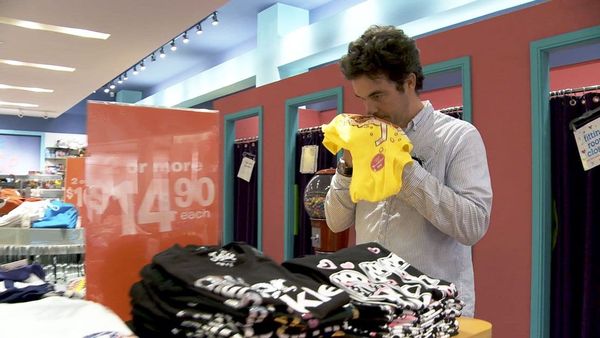Eye For Film >> Movies >> Stink! (2015) Film Review
Stink!
Reviewed by: Jennie Kermode

Jon J. Whelan is a single father. He lost his wife to breast cancer. Whilst he accepts that he will probably never know why she got so ill so young, he is concerned by the steep rise in breast cancer cases that has taken place in recent years. He's also developed a different set of concerns - the ones every primary care of children has but which his wife was hitherto responsible for. He's started looking at labels. When his children get new pyjamas for Christmas and remark that they smell funny, he looks at the labels on them, but finds no useful information. So he contacts the retailers. "Nothing to do with us, mate," is essentially the response he gets. They are sure all their products meet the safety standards because all their products meet the safety standards. What's actually in them? They don't know.
For Whelan, this is the beginning of a journey that will lead him to explore the US system of product labelling and what it is and is not permissible to sell. In particular, he looks at the concept of fragrance, a term most consumers assume represents a single ingredient but which can in fact refer to a combination of dozens of chemicals, natural or synthetic. In one particularly chilling sequence, an industry expert is asked, under oath, if it would be possible to put arsenic in a product under this label without having to declare it specifically, and sell the product legally. The answer - as long as it isn't sold as a foodstuff - is yes. This could mean something you use to clean kitchen surfaces, something in the clothes your children wear, or something you rub into your face.
No specific assertions about arsenic are made in the film but it's established that other potentially dangerous ingredients are used in preparations like these all the time. Certain fire retardants used in furniture and children's clothes are, for instance, known to be carcinogenic. Unfortunately the film presses its concern about this by arguing that fire retardants aren't really necessary (a sadly typical attitude in a country where a house goes on fire ever 86 seconds) rather than pointing out that there are safer alternatives. Similarly, the genuinely worrying presence of endocrine disruptors in cosmetics is tackled by treating such chemicals as if they're always a terrible thing, rather than vital tools in modern medicine that simply shouldn't be used in this quantity and context.
This rather slipshod approach to the science of the subject undermines what might otherwise be a very strong film. Even Whelan's worry about breast cancer is less justified when one considers that the US is ninth in the world when it comes to incidence of the disease, some way behind EU countries like Belgium and Denmark, where product controls are much stricter. There's more than one casual reference to an autism epidemic whose existence is widely disputed (more people are being diagnosed but that doesn't mean there are more cases), but which is herein assumed to be obvious. Overall, the impression one gets is that Whelan is a man who has got hold of some important knowledge and is working hard to bring it to light for noble reasons, but lacks the training and methodology necessary to do a thorough job.
With this in mind, the film is more interesting is a portrait of a man dealing with grief. Whelan's simple home movies and photographs are touching, as are the scenes of him playing with his kids (one of whom delivers an impressive boot to the camera from a swing). These act as an important reminder of the human factor at the heart of the message the filmmaker is trying to send to companies, their shareholders, and the politicians who pass laws that enable them to keep getting away with putting profit before people. There are other strong human stories here, such as the tale of a boy with a severe allergy to a particular aftershave who is unable to go to school because other teenagers won't stop wearing it. Why should they let his potential anaphylactic shock get in the way of them trying to impress girls? Meanwhile, the boy's mother worries because the aftershave company won't share their ingredients list so she can't work out what else she might need to protect him from.
Whelan has assembled a impressive volume of material here, much of which speaks for itself. The film is always visually interesting and it's generally well paced. He has undoubted talent as a filmmaker; he just needs a more thorough understanding of his subject.
Reviewed on: 24 Nov 2015















